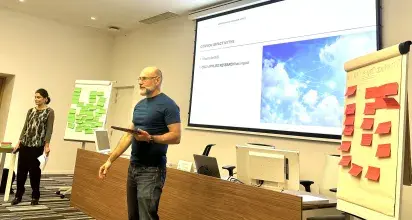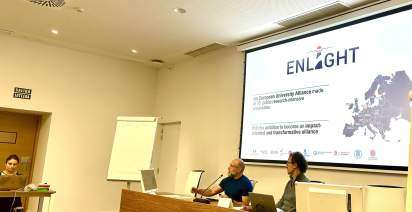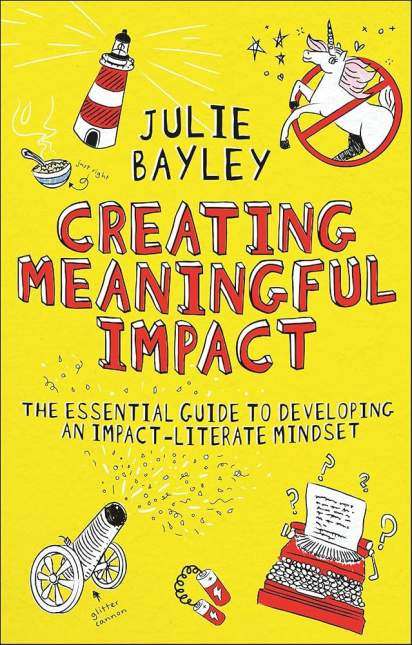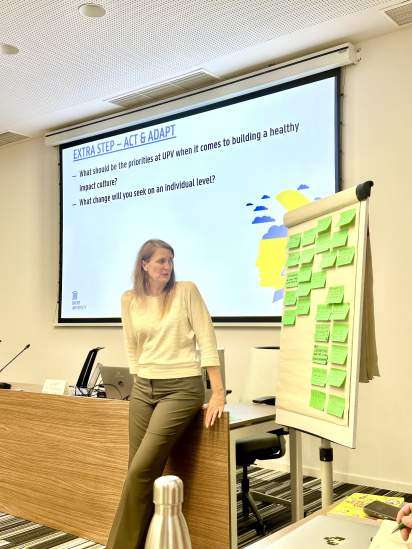
Igor Campillo and Gloria Nunes during their presentation.
Looking for societal impact, a global movement. EHU and Euskampus lead dialogue on turning research into societal impact
1st day of the course Social impact of research: How to direct your research towards societal impact?
Last Tuesday Oct 28, marked the start of a new course at the Library of EHU, Campus of Biscay. These training sessions, offered by the EHU's Social Impact Department in collaboration with Euskampus, are designed to help research staff deepen their knowledge, skills, and abilities so that they can incorporate social impact as a fundamental element of their research practice.
Specifically, the objectives of the course are:
- To provide information on the institutional contexts in which impact is embedded;
- To better understand the impact trajectory and impact processes;
- To provide knowledge and tools for evaluating, monitoring, and communicating impact;
- To analyze strategies for writing the impact section in European proposals.
The opening session featured in the morning, Ugo Mayor, Ikerbasque Research Professor and Director of Social Impact at EHU, Igor Campillo, General Director of Euskampus Fundazioa and Gloria Nunes, Head of Internationalization at Euskampus (in the picture from right to left). This sesión, entitled “Understanding research impact”, emphasized the university’s essential role in creating, transferring, and disseminating knowledge to society — ultimately contributing to the wellbeing of the broader community.


Participants represented a wide range of disciplines, from senior researchers in the Faculties of Social Sciences, Science and Technology, and Medicine and Nursing, amongst others, to Ikerbasque fellows and early-career PhD candidates.
Referring to Julie Bayley’s Creating Meaningful Impact, the instructors defined impact as “when people outside academia benefit from the research we do within it” — with the ultimate goal of making the world a little better.
Some key takeaways from the first session included:
- Engagement if crucial in order to test the needs of society, otherwise we might be looking for something that is not necessary to society.
- Impact can be instrumental, capacity-building or conceptual.
- Impact implies a change in a thing, a change in the way we think something or the way we do something.
- Be open for new opportunities
- Be aware of the leaky pipeline of impact
- When communicating impact, it does not always have to be newsworthy, but to show how we are doing.
- Think out of the box, that is where the magic is.
- Bear in mind risk analysis.
In the afternoon, Esther de Smet from Ghent University delivered an inspiring talk on the institutional context of impact. She shared insights into impact literacy and introduced practical self-assessment tools such as those developed by the university alliance ENLIGHT, Impact Assessment Tool, and the UK’s repository of Impact Case Studies.
She also highlighted the importance of recognizing and rewarding researchers for the societal benefits of their work. “Our society is built on science, but science must stay connected to society”, Smet concluded, closing the first day with a warm and encouraging message to participants.
The course has 5 more sessions where the following will be treated:
- Planning for impact, with Áine Mhic Thaidhg. Research Impact Officer University of Galway (Ireland).
- Impact Assessment. Evidence Gathering and Monitoring of Research Impact with Sarah Morton. Director and Co-Founder of Matter of Focus and Honorary Fellow at the University of Edinburgh (United Kingdom).
- Drafting the Impact Section in Horizon Europe proposals, with Rita Gil Mata. Co-founder and CEO of "Fundamentally Science" (Portugal).
- Describing and Communicating Impact, with Saskia Walcott. Chief Executive Walcott Communications (United Kingdom).
More information on EHU’s web page.


Suscríbete a Newskampus
Y recibe nuestras últimas noticias en tu email.